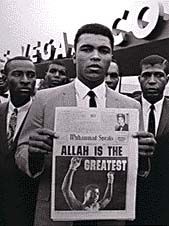Even though it might have become quite a personal statement in the West, religious conversion is still a topic of taboo in India - considered sensitive both by the communal and secular forces, given the treatment quite akin to that given to the subject of sex. Indeed, where religion itself is a political weapon used by both the right and the middle (thankfully, the left in India is intellectually inclined and hence does not debate religion), religious conversion is a topic more vitriolic than religion itself.
But when we do observe the pattern of religious conversion, we will realize that barring some celebrities, people (even celebrities) do not change religion for matters of "faith in a given (form of) god(s) or traditions/ beliefs of a given religion", but more for the social treatment meted out to and by the followers of the religion to fellow believers. Whether it was Babasaheb Ambedkar embracing Buddhism after being ostracized for being a "low-caste" Hindu, or Mohammed Ali (aka Cassius Clay) renouncing Christianity to embrace Islam for the discrimination meted out to him as a Black Christian, it was the social 'restrictions' imposed in the name of religion which forced them to change their 'faith'.
While Babasaheb and Ali might be few public figures, the story has played itself out umpteen number of times in India when tribals converted themselves to Christianity or the so called "lower castes" convert to Islam or Christianity [though, some elements of the Church also allegedly promote conversion proactively but that doesn't counter the initial trigger of social treatment meted out to these classes]. So widespread and repeatable is this phenomenon that the Vishwa Hindu Parishad has had to create a separate outfit called Adivasi Kalyan Ashram to ensure that tribals are treated well and provided adequate resources like education so that they are not forced into converting.
It is ironic that religion was created in the first place to liberate men from the lowly confines of social order to achieve a higher goal of discovering the ultimate truth. Spirituality hence remains the only method to liberate us from the tethers of traditional religions which bind humanity back into the same wormhole and prevent us from achieving greatness as a race, species and as individuals.
Thankfully, in a large part of our world today we have democratized and liberal governments which do not force religious following on their citizens (even if not all of them are secular states), and people in such countries have on their own largely given up any discriminatory practices based on dogmatic beliefs perpetuated by zealots or demagogues.
But we have a long way to go and possibly after Open Source software and now Open Source hardware, Open Spirituality will probably need to be the next movement for the world which will liberate us from social restrictions of age old discriminatory practices promulgated in name of religion!
.
But when we do observe the pattern of religious conversion, we will realize that barring some celebrities, people (even celebrities) do not change religion for matters of "faith in a given (form of) god(s) or traditions/ beliefs of a given religion", but more for the social treatment meted out to and by the followers of the religion to fellow believers. Whether it was Babasaheb Ambedkar embracing Buddhism after being ostracized for being a "low-caste" Hindu, or Mohammed Ali (aka Cassius Clay) renouncing Christianity to embrace Islam for the discrimination meted out to him as a Black Christian, it was the social 'restrictions' imposed in the name of religion which forced them to change their 'faith'.
While Babasaheb and Ali might be few public figures, the story has played itself out umpteen number of times in India when tribals converted themselves to Christianity or the so called "lower castes" convert to Islam or Christianity [though, some elements of the Church also allegedly promote conversion proactively but that doesn't counter the initial trigger of social treatment meted out to these classes]. So widespread and repeatable is this phenomenon that the Vishwa Hindu Parishad has had to create a separate outfit called Adivasi Kalyan Ashram to ensure that tribals are treated well and provided adequate resources like education so that they are not forced into converting.
It is ironic that religion was created in the first place to liberate men from the lowly confines of social order to achieve a higher goal of discovering the ultimate truth. Spirituality hence remains the only method to liberate us from the tethers of traditional religions which bind humanity back into the same wormhole and prevent us from achieving greatness as a race, species and as individuals.
Thankfully, in a large part of our world today we have democratized and liberal governments which do not force religious following on their citizens (even if not all of them are secular states), and people in such countries have on their own largely given up any discriminatory practices based on dogmatic beliefs perpetuated by zealots or demagogues.
But we have a long way to go and possibly after Open Source software and now Open Source hardware, Open Spirituality will probably need to be the next movement for the world which will liberate us from social restrictions of age old discriminatory practices promulgated in name of religion!
.

When we are born.. no one chooses his religion, nor his country .... still his god becomes the true god, his country becomes the greatest country...one should question if it is actually HIS religion or HIS country ... the world that we live in , probably one has to unlearn everything for thinking rationally about anything...
ReplyDelete-Saurabh